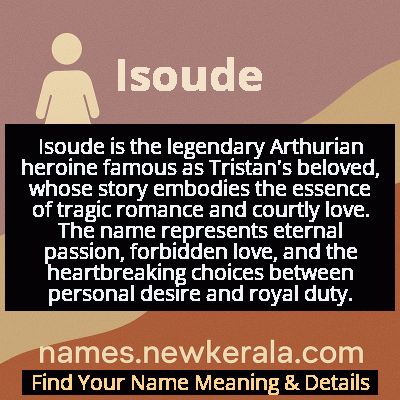Isoude Name Meaning & Details
Origin, Popularity, Numerology Analysis & Name Meaning of Isoude
Discover the origin, meaning, and cultural significance of the name ISOUDE. Delve into its historical roots and explore the lasting impact it has had on communities and traditions.
Name
Isoude
Gender
Female
Origin
Arthurian
Lucky Number
1
Meaning of the Name - Isoude
Isoude is the legendary Arthurian heroine famous as Tristan's beloved, whose story embodies the essence of tragic romance and courtly love. The name represents eternal passion, forbidden love, and the heartbreaking choices between personal desire and royal duty.
Isoude - Complete Numerology Analysis
Your Numerology Number
Based on Pythagorean Numerology System
Ruling Planet
Sun
Positive Nature
Leaders, ambitious, highly driven, self-reliant, innovative.
Negative Traits
Overly aggressive, domineering, impatient, selfish.
Lucky Colours
Red, orange, gold.
Lucky Days
Sunday.
Lucky Stones
Ruby, garnet.
Harmony Numbers
2, 3, 9.
Best Suited Professions
Entrepreneurs, managers, engineers.
What People Like About You
Courage, determination, leadership.
Famous People Named Isoude
Isolde of Ireland
Legendary Queen
Central figure in the Tristan and Isolde romance, known for her tragic love story with Tristan
Isolde the Fair
Literary Character
Primary heroine in numerous medieval romances, symbolizing idealized courtly love
Isolde of the White Hands
Literary Character
Alternative Isolde character who marries Tristan, adding complexity to the love triangle
Name Variations & International Equivalents
Click on blue names to explore their detailed meanings. Gray names with will be available soon.
Cultural & Historical Significance
Throughout medieval Europe, Isoude's story was adapted across multiple cultures, with each version reflecting contemporary attitudes toward love, honor, and duty. Her character evolved from early Celtic prototypes through the sophisticated French romances of Béroul and Thomas of Britain to Gottfried von Strassburg's German masterpiece. The enduring power of her narrative lies in its exploration of universal themes: the conflict between personal desire and social obligation, the transformative power of love, and the tragic consequences of passion that defies societal norms.
The cultural impact of Isoude extends beyond medieval literature into modern interpretations across various media. Her story has inspired operas, films, novels, and artistic works that continue to reinterpret her character for new generations. As a cultural symbol, she represents the timeless appeal of tragic romance and the human struggle between following one's heart and fulfilling societal expectations.
Extended Personality Analysis
Isoude is typically characterized by profound emotional depth, unwavering loyalty, and a passionate nature that defines her tragic destiny. Her personality combines royal dignity with intense vulnerability, creating a complex figure who navigates the impossible choices between duty to her husband King Mark and her consuming love for Tristan. She demonstrates remarkable intelligence and resourcefulness, particularly in the famous 'trial by ordeal' scene where she cleverly manipulates circumstances to prove her innocence while maintaining her secret love.
Beyond her romantic attributes, Isoude exhibits strength and resilience in facing the consequences of her choices. Her character development shows a woman growing from a political pawn into an active agent of her own destiny, even as that destiny leads to tragedy. The dual aspects of her personality—the public queen and the private lover—create a rich psychological portrait that has made her one of literature's most enduring and relatable tragic heroines.
Her emotional authenticity and the authenticity of her suffering give her story its timeless appeal. Isoude embodies the paradox of being both powerful and powerless—a queen who rules a kingdom but cannot control her own heart. This complexity makes her not just a romantic figure but a profound study in human psychology, representing the universal struggle between societal expectations and personal truth.
Modern Usage & Popularity
In contemporary times, Isoude and its variations remain relatively rare but maintain a distinctive presence, particularly among parents drawn to Arthurian names and literary traditions. The name enjoys periodic revivals, often coinciding with new adaptations of the Tristan and Isolde story in film, television, or literature. While not appearing on mainstream popularity charts, it holds appeal for those seeking names with historical depth, romantic associations, and Celtic roots. Modern usage tends to favor the 'Isolde' spelling, which feels more accessible while preserving the name's legendary heritage and elegant sound. The name carries an air of sophistication and literary prestige that appeals to parents looking for distinctive yet meaningful names for their daughters.
Symbolic & Spiritual Meanings
Isoude symbolizes the eternal conflict between heart and duty, representing love that transcends social boundaries and personal safety. Her story serves as a metaphor for the transformative and destructive power of passion, where love becomes both salvation and ruin. The love potion that binds her to Tristan symbolizes the uncontrollable nature of true passion—a force that cannot be reasoned with or denied. Her character embodies the idea of love as fate, where individuals are swept along by forces beyond their control, making choices that lead inevitably to both ecstasy and tragedy. This symbolic richness has made her story a touchstone for discussions about free will, destiny, and the price of authentic emotional experience across centuries of artistic interpretation.

